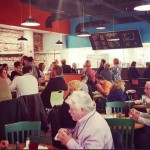When we were first established
The length of a woman’s stay here varies, depending on the program. On the diversion side when women come to us in lieu on incarceration, it’s all outpatient work for two to three years before they graduate. We’ll see them all the time on the front end, and as they progress we see them less and less.
Our re-entry program at Turley Residential Center is an 8-week program, and then out at Eddie Warrior Correction Facility it is 16 weeks. The time spent with us really depends on the woman we’re serving, where she’s referred from and what correctional facility she’s in.
Since so many women have a hard time finding a job, we most recently opened a restaurant in Downtown Tulsa called Take 2, our Resonance Cafe. When some of our women are released, they can come work at the restaurant. It’s not really to groom them for food service as much as it is about work ethic and working on soft skills. Having that extra six months on staff, making sure their needs are met, and making sure they’re staying on track is huge. Right above the cafe is also a 2,500-square-foot loft with three bedrooms and two bathrooms.
Transportation is such a big issue, but when they come work for us they live upstairs and don’t need a car. Our case managers meet with them and have house meetings once a week. They’re in group therapy and relapse prevention. We try to do everything we can to surround them with positive role models and support groups. The goal for them is to stay about six months before we springboard them to a better job. We just launched Take 2 in March 2016, and we’re really excited about it.
Our biggest goal for this coming year is focusing on the criminal justice reform that is taking place in Tulsa. We want to make sure we’re keeping the same programs we have, but making them stronger and adding more classes.
We also want to focus more around Take 2 and trying to employee more women. We’re growing it incrementally. So our first goal for that is for our restaurant to be self-sustaining by year one, which is March 2017. It costs about $400,000 for us to have the restaurant and employ former offenders and be able to house them. We’ve also started our box lunches and we’d eventually like to start offering breakfast.
All nonprofits need donations. Many of our clients have had their driver’s license taken away, and if you lose your ability to drive, you’re dependent on public transit. It’s pretty hard if you have to take kids to child care or drop them off at someone’s house to then ride the bus to come to us. We’re always working to help women get their driver’s licenses back, but it’s really expensive. All of that requires help from us financially. Support in that area is always needed, but the ultimate goal is to take a few barriers away from these women so that they can find a job.
It’s important to have these women surrounded by their peers. A lot of the women we work have a long history of drug and alcohol abuse, and they have a lot of shame about that. They have shame knowing they probably weren’t the best parent or a good employee or they weren’t a good daughter or sister. For them to sit around and talk in groups and support each other really helps heal that. Even with our restaurant Take 2, when these women live and work together there forms a really strong support system.
© Humane Exposures / Susan Madden Lankford










